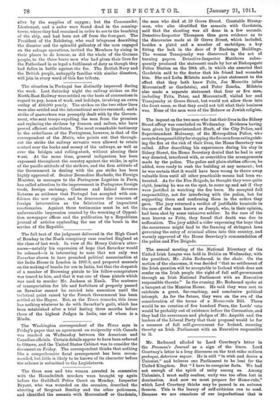The situation in Portugal has distinctly improved during the week.
Last Saturday night the railway strikes on the North-East Railway were settled on the basis of concessions in regard to pay, hours of work, and holidays, involving an extra outlay of £60,000 yearly. The strikes on the two other lines were also settled and the international service resumed; ands, strike of gasworkers was promptly dealt with by the Govern- ment, who sent troops expelling the men from the premises and replacing the strikers by firemen and sailors, who have proved efficient substitutes. The most remarkable testimony to the orderliness of the Portuguese, however, is that of the correspondent of the Malin, who points out that through- out the strike the railway servants were allowed to retain control over the.books and money of the railways, as well as over the bridges and rolling-stock, without abusing their ielist. At the same time, general indignation has been expressed throughout the country against the strike, in spite of the pacific attitude of the strikers, and the firm attitude of the Government in dealing with the gas strike has been highly approved of. Senhor Bernadino Machado, the Foreign Minister, in messages to the Portuguese Legation in Paris, has called attention to the improvement in Portuguese foreign trade, foreign exchange, Customs and Inland Revenue Returns, as evidence that Portugal has accepted with con- fidence the new regime, and he denounces the rumours of foreign intervention as the fabrication of impenitent reactionaries. Against these testimonies must be set the unfavourable impression created by the wrecking of Opposi- tion newspaper offices and the publication by a Republican journal of articles applauding the use of the bomb in the service of the Republic.










































 Previous page
Previous page